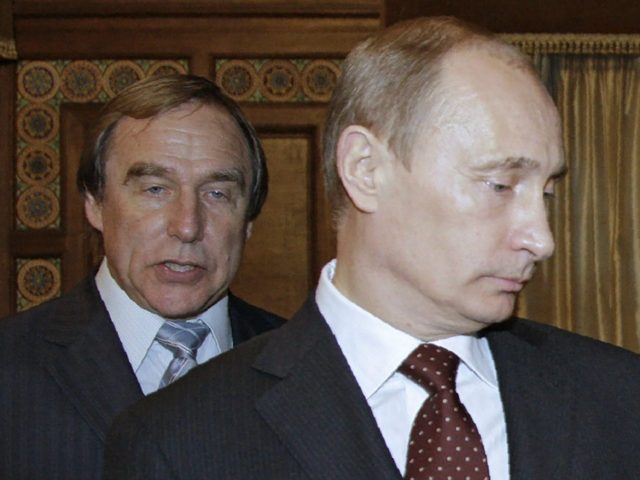On Thursday, the Syrian city of Palmyra, which was recently recaptured from the Islamic State, hosted a concert by Russian cellist Sergei Roldugin — who is more famous for his friendship with Russian president Vladimir Putin, and his role in the “Panama Papers” story, than his music career.
The concert was meant as a victory dance of sorts, as described by NBC News:
Cellist Sergei Roldugin soloed his way through a dance tune by obscure 20th-century Russian composer Rodion Shchedrin. The performance was part of a classical concert by the famous Mariinsky Orchestra celebrating the liberation of Palmyra from ISIS.
The orchestra, which hails from Putin’s home city of St. Petersburg, performed three pieces in the historic amphitheater of Palmyra, which once hosted Roman plays.
The orchestra was greeted by Putin, via video, and cheered by a crowd including UNESCO dignitaries, Russian and Syrian troops, Muslim and Christian clergy and a smattering of locals, including enthusiastic children in national getup.
“The event is … a sign of memory, hope and a sense of gratitude,” Putin said, speaking from his office.
As NBC goes on to explain, Palmyra was captured by ISIS in 2015, partially razed despite its status as a UNESCO World Heritage Site, retaken by the Syrian government Russian airpower in March, and then painstakingly scoured for thousands of bombs left behind by the Islamic State savages.
When he is not playing the cello, Roldugin whiles away the hours by managing a $2 billion empire of offshore shell companies created by the now-infamous Mossack Fonseca law firm. According to Putin, Roldugin is also a philanthropist who donates Stradivarius violins to the Russian state.
“Roldugin dodged the press after his performance and was driven away in a personal military jeep with a guard of Russian soldiers,” NBC reports.
BBC World Affairs editor John Simpson took the trip to Palmyra with Roldugin and his orchestra, plus about a hundred other journalists. Simpson wrote of being surrounded by armored vehicles and covered by a swarm of Russian military helicopters on the drive, with one brief blackout imposed by military guides due to gunfire in the area.
“Imagine the reaction if something had happened to us. It would have been a public relations disaster for President Putin and the Kremlin; the perception would have been that Russia had no real grip on Syria,” said Simpson.
He described the concert as very short — only about 20 minutes — but well-staged, and probably successful in conveying the message that Russia does have a real grip on Syria.
“This coming Monday is the big Russian celebration of VE Day. It won’t be as grand an occasion as last year, the 70th anniversary, but it will still be pretty big,” Simpson observed. “President Putin clearly wants to show that under him the Russian Federation is as successful and strong as the old Soviet Union was under Stalin, back in 1945.”
“What better way to demonstrate the new world-reach of Russian power than to have Russia’s best orchestra playing Prokofiev in the heart of the ancient city which Russian arms had played a major part in liberating from the so-called Islamic State? Brilliant, as long it worked. And it did work, magnificently,” the BBC editor judged.
He noted that senior Russian officers attending the event gave Putin enthusiastic applause, because they “knew that their boss had scored a public-relations triumph.”
“Today’s action involved major inconvenience and dangers for everyone, being in a country at war close to where hostilities are still ongoing. That has demanded great strength and personal courage from you all,” Putin said, in his televised remarks to the audience.
Another BBC report identified the conductor of the orchestra as Valery Gergiev, late of the London Symphony Orchestra, a solid Putin supporter who backed the annexation of Crimea in 2014 and “performed in the capital of South Ossetia when Russia and Georgia were fighting over the territory.”
Not everyone applauded the performance. British Foreign Secretary Philip Hammond called it “a tasteless attempt to distract attention from the continued suffering of millions of Syrians” and said it “shows that there are no depths to which the regime will not sink.”

COMMENTS
Please let us know if you're having issues with commenting.